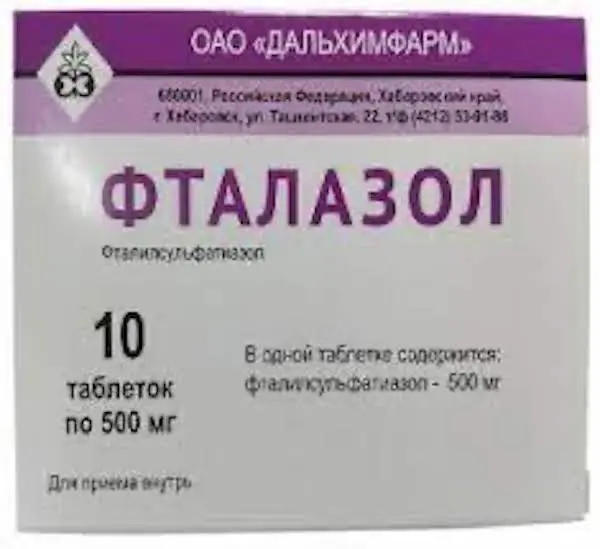Description
Phthalazole is a type of sulfonamide drug that has a similar structure to para-aminobenzoic acid (PABA). It competes with PABA for incorporation into the synthesis of folic acid in microbial cells, which leads to disruption of folic acid formation. This, in turn, hinders the synthesis of purine and pyrimidine bases that are crucial for the growth and development of microorganisms.
Phthalazole is most effective against vegetative forms of microbes, but its effect takes some time to develop since microbial cells have PABA reserves. However, its affinity for dihydrofolic acid synthetase, the enzyme that limits folic acid formation, is weaker compared to PABA. As a result, high doses of phthalazole are necessary to prevent microorganisms from using PABA present in the tissues, to avoid the formation of resistant strains of pathogens that are unaffected by sulfonamide drugs.
Apart from its antibacterial properties, phthalazole and other sulfonamide drugs have an anti-inflammatory effect that is linked to their ability to limit leukocyte migration, reduce the total number of migrating cellular elements, and partially stimulate the production of glucocorticosteroids.
It is essential to note that the antimicrobial spectrum of phthalazole, like other sulfonamides, is narrower than that of antibiotics. It has a bacteriostatic effect on specific strains of microorganisms such as Streptococcus spp., Neisseria meningitidis, Neisseria gonorrhoeae, Escherichia coli, Pseudomonas aeruginosa, Shigella dysenteriae, and Proteus vulgaris.
- Orally, in acute dysentery in adults on days 1-2 – 1 g 6 times a day, on days 3-4 – 1 g 4 times a day, on days 5-6 – 1 g 3 times a day. The average course dose – 25-30 g. After 5-6 days the second course of treatment is carried out: 1-2 days – 1 g 5 times a day (during the day – every 4 hours, at night – 8 hours), 3-4 days – 1 g 4 times a day (at night not given), 5 day – 1 g 3 times a day. The total dose in the second cycle – 21 g, in a mild course – 18 g. Higher doses for adults: single 2 g, daily – 7 g.
- Children over 3 years of age take 0.25-0.5 g 4 times daily.
- During other infections in adults during first 2-3 days we prescribe 1-2 g every 4-6 hours, next 2-3 days – half doses; in children – 0.1 g/kg/day in equal doses every 4 hours with a night break, during next days – 0.2-0.5 g every 6-8 hours.
- During prevention of purulent complications during intestinal surgery in adults, 1 g 4 times daily is prescribed for the first 2-3 days, half-dose of 0.5 g 4 times daily for next 2-3 days. Treatment is combined with administration of antibiotics.





